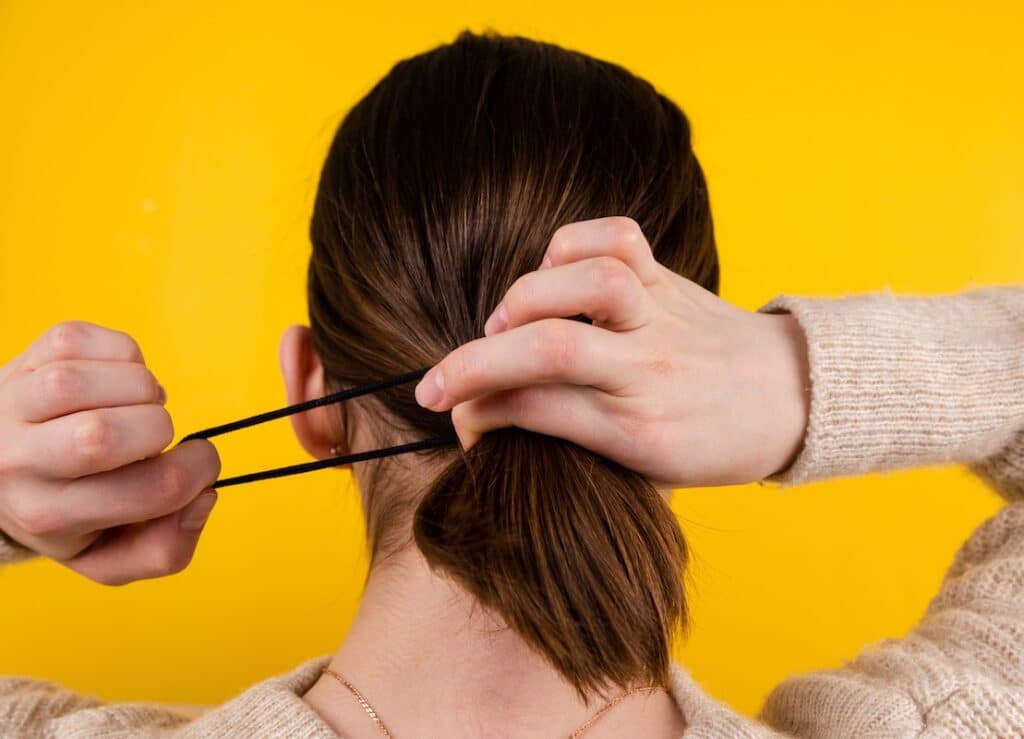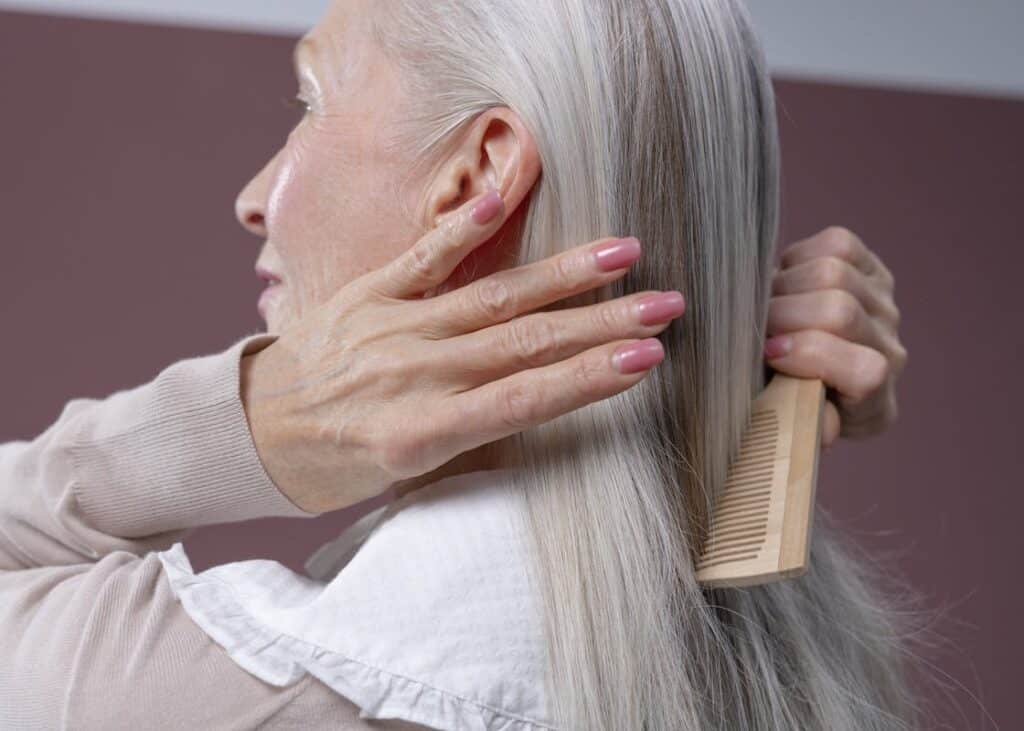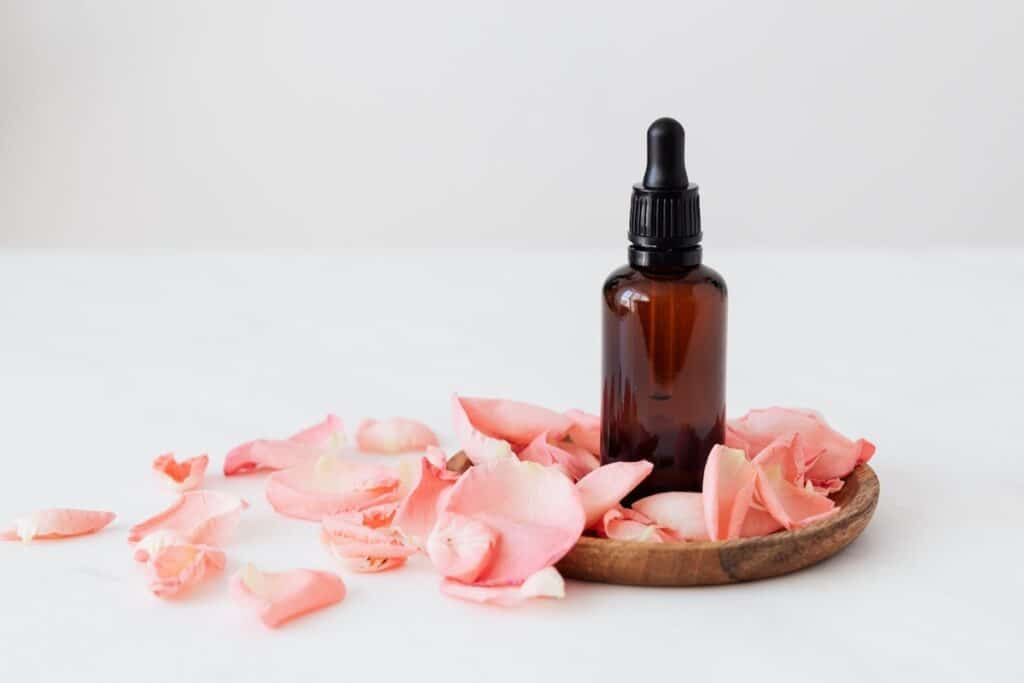It's one thing to have naturally fine hair, but it's quite another to see it getting thinner by the day, whatever its original thickness. You shouldn't wait to observe sparse areas on your scalp to take this matter seriously.
Like many physical characteristics, the nature of our hair is mainly linked to our genetic heritage: colour, thickness and curls are all part of our heritage. So there's no need to envy your colleague's voluminous hair and pretty curls. A colleague who might just as well envy you your straight bob!
While fine hair needs special care (no overly rich textures that weigh it down, no aggressive styling, no straightening or relaxing, etc...), it is still healthy hair. It is simply fragile by nature.
However, whatever your starting point - thin or thick hair - you should be concerned as soon as you notice the first signs of thinning because the situation will not improve without appropriate care.

Thinning hair: early warning signs
Unfortunately, this loss of density is often insidious, and you may notice a volume loss by doing a hairstyle that you haven't done for a while, for example: the ponytail is thinner, the elastic doesn't 'hold' as well as it used to; looking at photos from a few years ago can also make you realise that your hair has lost some of its density over time. You may also notice that it breaks more frequently when styling. This is a sign that the keratin has become brittle and the hair fibre is damaged: urgent repairs are required.
If your hair tends to thin, there may be several causes: internal and external ones. Unfortunately, they can combine. Once identified, it's easy to find effective solutions to thicken your hair or at least slow down its deterioration.
Follow our expert advice to avoid losing hope in the face of thinning hair.
Internal causes :
Many internal factors can cause your hair to thin: sensitivity to androgens, iron deficiency, thyroid imbalance...
If the scalp is sensitive to androgens (more than 90% of cases), the thinning of the hair is not necessarily accompanied by hair loss . Often we only become aware of the problem when the hair becomes more difficult to style, when it tangles when brushing. There may also be areas of the skull where the hair is thinner (these areas are located differently whether it is male hair loss or female hair loss). Androgenetic hair loss leads to a de facto impoverishment of the hair, as the hair life cycles will get shorter and shorter, producing weaker and weaker hair each time. Eventually there will be no regrowth at all. Before this happens, treatment is essential.
Note: what some people call the ageing hair is nothing more than a marketing term for the consequences of androgenetic alopecia, mainly in women. After the menopause, the potentially harmful effect of androgens (male hormones) on hair follicles is no longer counterbalanced by female hormones. Nevertheless, without an androgenetic predisposition, hair will continue to renew itself at its usual rate, with no noticeable damaging effect on hair quality or quantity.

Ageing hair: myth or reality?
Iron deficiencyan essential nutrient for healthy hair, routine or a thyroid problem can also be responsible for hair becoming thinner and thinner. In the case of a thyroid problem, other characteristics are present, as the texture of the hair can change: cf. Hair loss and thyroid. An iron deficiency can easily be remedied by supplementation and a balanced diet, although it may take several months before levels are sufficiently high for hair to regain its full health. Thyroid imbalances are commonly treated these days and once the appropriate medical treatment has been put in place, hair will once again return to its normal growth rate - unless other untreated or unidentified factors are at play. To fortify hair and stimulate growth, it is therefore advisable to remain vigilant and to undertake regular supplementary treatment. (one-off vitamin treatment).
External causes
Stress is an aggravating factor in hair problems. This factor must be taken seriously, as it can increase or even trigger hair weakening.
A word of warning for women on contraceptives: be careful about your choice of pill: if its composition encourages androgenism, it may contribute to thinning hair. See our page : Hair and hormonal contraception.
As we saw earlier, a loss of volume may be the result of persistent breakage. Curly or frizzy hair, hair mistreated by aggressive cosmetic treatments carried out too close together over time, haircare products unsuited to the type and nature of the hair, etc. - all these factors can lead to thinning hair. Note that hair loss can be confused with breakage: these are two different phenomena that need to be treated accordingly.

Don't confuse hair breakage with hair loss
Solutions for thicker, denser hair
Without the right hair treatment at the earliest signs, thinning hair will never regain its original volume. So it's important to find the right treatment before it's too late, otherwise all we can do is repair and fix a situation at the time, not necessarily restore the density you had 10 or 20 years ago.
The best solution is to combine prevention and treatment for the ultimate anti-thinning effect!
Prevention: gentleness first and foremost
If your hair is fine and/or has a tendency to thin, the key to success is to treat it gently and kindly => SO
- do not use a hair dryer that is too hot or too close to the hair fibre
- space out cosmetic manipulations that damage the hair fibre as much as possible
- no cosmetic products such as hairsprays or gels, which will coat the keratin and cause premature breakage
- avoid using certain vegetable oils (coconut oil eg), which can make the hair heavier, stiffer and cause breakage
Treatment: care and repair

Clauderer serum to activate regrowth
- a haircare routine for fine hair includes: a gentle shampoo, a light cream to moisturise and strengthen the hair fibre (chitin in Crème N°25 is an excellent solution) and, ideally, air dry and style with your fingers. Of course, we prefer natural hair products that won't damage the scalp or hair fibre.
- massage your scalp regularly to oxygenate the collagen around the hair follicles. If necessary, use a light stimulating oil. The benefits are twofold: you create a more favourable environment for their development, and you make them more receptive to the active treatments they are about to receive. In fact, thinning hair corresponds, under the scalp, to a hair follicle and root that have themselves shrunk. This is where a local subcutaneous treatment should act.
- boost the strength of hair follicles to stimulate the growth of stronger, longer-lasting hair that is thicker in the long term: Regrowth Activating Serum N°6R combined with Lait Clauderer to purify the scalp and accentuate the effect of the serum subcutaneously.
- Start taking vitamins specially formulated for the beauty and health of the hair: vitamin B, brewer's yeast, trace elements. They are most effective when used in synergy with a local treatment.
- Healthy lifestyle and diet: without going overboard, adopt a healthy diet, favouring unprocessed or minimally processed foods, good-quality animal or vegetable proteins, and foods rich in fe, zinc and B group vitamins.
And don't forget to regularly trim thinning ends that are in poor condition: a suitable cut can add volume to the hair while eliminating thin, dull lengths. Think also of the play of light provided by colouring to complete the illusion of denser hair.
Your questions about thinning hair
My hair is thinning. What vitamins do you recommend?
Thinning hair is a symptom, the cause of which must be found if it is to be treated properly. In all cases, food supplements can only be used as an adjunct to a local treatment designed to stimulate the growth of thicker hair.
How can I thicken my hair?
With Clauderer treatment, we observed an increase in root thickness of 55 % and keratin thickness of 20 % after 4 months of treatment (representative sample of 300 people).


Hello. I have a question. Could tapering the hair at the hairdresser's make it thinner? Thanks
Hello, thank you for your message. Having your hair cut by a hairdresser can certainly weaken hair that is already fine. Hair thinning is a completely different phenomenon that starts with a weakening of the hair follicle: it's a deregulated life cycle that no longer allows the hair follicle to produce good quality hair. The hair renews itself more and more quickly, becomes weaker and weaker and grows less long.
To put a stop to the phenomenon, we need to know the exact cause or causes. the Clauderer Team